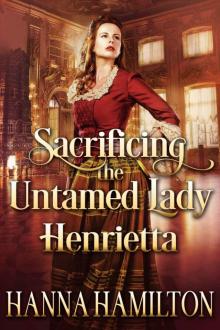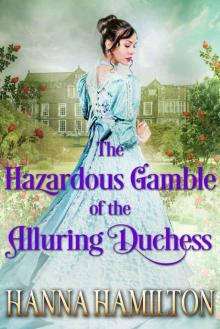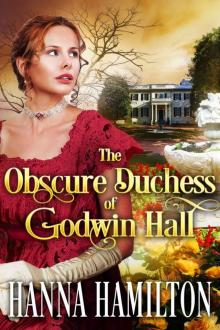- Home
- Hamilton, Hanna
The Obscure Duchess of Godwin Hall: A Historical Regency Romance Novel Page 14
The Obscure Duchess of Godwin Hall: A Historical Regency Romance Novel Read online
Page 14
“The constable,” Mr. Langham said, announcing himself so that the butler would not have to trouble himself by making any inquiries. “And my deputy, Mr. Rattings.”
“Constable...yes.” The butler gave a rather agitated bow. “Yes, of course. We are most grateful that you were able to come to us so quickly. I have been instructed to take you to her Ladyship directly.”
He led them up the back stairs and into a main hall, which was far grander than any room that Mr. Langham had seen before. He found himself tugging at his clothing as if in the hope that it might make him more comfortable in these splendid surroundings.
“I hardly need tell you that all the household is in terrible distress,” the butler said.
“Of course,” Mr. Langham replied with great authority. “A terrible thing has happened here. We must see justice served at once.”
“I pray that justice may be delivered, constable,” an old and quavering voice called out from somewhere above them. The two men looked up to see an old lady, dressed in full mourning, descending the stairs. She had the look of someone who, though already elderly, had aged a great deal in recent times.
“I am Lady Horatia Blenheim,” she said, beginning to descend the rich staircase while leaning heavily upon a jet-topped cane. “I am the grandmother of the Duke. The late Duke,” she corrected herself, and then passed a black-edged handkerchief over her eyes.
“My lady,” Mr. Langham said, sinking into a bow and gesturing for Rattings, whose manners were not exactly coarse but not precisely fit to mingle with the nobility, to do the same. “I understand that it was you who commissioned us to come here. We come first to offer our sincerest condolences for your dreadful bereavement.”
“Yes, indeed,” the old lady said. She reached the bottom of the staircase and advanced upon the two men, extending her hand for them both to kiss. “I expect you already know that he was soon to be married. It makes the death seem even more cruel, do not you agree?”
“It must have taken a very cruel person indeed to commit such a crime,” Rattings observed. Mr. Langham felt himself wincing a little at his colleague’s lack of tact. He had hoped to introduce the matter of the perpetrator more carefully.
But perhaps he had underestimated Lady Horatia. She did not seem shocked by the mention of the murder, merely galvanised.
“Indeed.” She drew herself up to her fullest height. “And before we speak of it any further, I wish to be the first to tell you that I believe that my grandson did not know what he was saying when he accused Lady Rebecca Winterson. Her character is without blemish, and she is certainly not capable of committing such a terrible crime.”
Mr. Langham was rather glad that Lady Horatia had introduced the matter of Lady Winterson herself so that he did not have to do it.
“Thank you for that insight, my lady,” he said, with another low bow. “Perhaps we might find somewhere where we may discuss it further.”
“Not without me, I beg of you,” a young woman’s voice interrupted from the other end of the entrance hall. The group turned to the source of the voice.
Mr. Langham was greatly struck by the sight of the young lady who was moving towards them. Her features were well composed and her bearing demonstrated the type of good breeding and poise that he had always so admired in the ladies of her elevated class.
“This is Lady Rebecca Winterson,” Lady Horatia said. Clearly, despite the unusualness of the situation, she would not fully take leave of usual manners and fail to introduce the young lady to company. “Rebecca, my dear, this is Mr. Langham and Mr. Rattings. They have come to establish the truth of what happened to Charles.”
“It is not for us to establish the truth,” Mr. Langham interjected hastily. “That is the job of the justice of the peace. We are merely here to apprehend the guilty party.”
Despite the gravity of the situation, the young lady’s somber expression was offset by eyes that were clear and direct, a figure that bore itself erect and an expression that held no suggestion of the burden of guilt.
Either she is innocent, he thought, or she is a finer actress than any to ever grace the London stage.
“I thought I had better come and meet you rather than waiting for you to send for me,” she said, extending a hand to each of the officials in turn. “I have nothing to hide, and therefore I wish to speak to you as openly as I can.”
“My lady,” Mr. Langham said, bowing again. This time, Rattings seemed to need no encouragement to do the same. Mr. Langham hoped that his colleague would not be too taken in by Lady Rebecca’s superficial charms to perform his office properly.
This is the true problem with murderesses, he thought, They are able to exert a charm that takes everyone under its spell. This view was formed primarily by a vague impression that he had obtained from novels and newspapers, but he held it strongly nonetheless.
The small party proceeded to the drawing room, and Lady Horatia directed one of the servants to fetch tea for the guests.
“Given the lateness of the hour,” she said, managing to summon up a tired smile despite her obvious weariness and grief, “I think that all of us would benefit from a little refreshment.”
Mr. Langham nodded courteously, though in truth he would himself have preferred a glass of ale. But from what he understood, the high and mighty of the land were more particular about such trifles. No matter. He did not suspect that this investigation would be very long-lived.
“I hope that I can rely on you ladies to provide every assistance in this matter,” he said.
“I have already provided the best assistance that I can offer,” Lady Horatia said, “in pledging to you my belief in Lady Rebecca’s innocence. I firmly believe that if you choose to focus your efforts on her, you make it far less likely that the real facts of my grandson’s death will be known.”
Mr. Langham nodded.
“I am grateful for your contributions, my lady,” he said. “Perhaps you would have the goodness to confirm some of the facts that the doctor who attended your grandson kindly provided me.”
He looked down to consult the piece of paper on which he had written his notes.
“The doctor believes that your grandson ingested a fatal dose of poison. Given that his illness commenced last night, the same doctor believes that the dose must have been administered some time yesterday evening.”
Lady Horatia made no indication that she intended to reply, so Mr. Langham continued.
“Yesterday evening, the occupants of the house numbered at six. My lady, the Earl of Sheffield, the late Duke, his younger brother Lord Andrew Godwin, Lady Rebecca, and Miss Caroline Swanson. Is that correct?”
“And the servants,” Lady Horatia added. “You would do well to consider them as well. After all, they are the ones who prepare and serve the food.”
“My colleague Mr. Rattings will discover if there is anything to be learned from the servants,” Mr. Langham said. Though he was not pleased with this old lady telling him how to perform his job, he managed not to show his annoyance.
“However, first we must direct our attention at the lady whom the victim himself identified as the…” he paused delicately, not knowing how best to express himself, “The perpetrator.”
“I am entirely innocent,” Lady Rebecca Winterson said immediately, scarcely allowing him to finish the words.
“Lady Rebecca,” Mr. Langham said, before pausing to take a judicious sip of tea. “I have no wish to believe any of your late fiancé’s accusations against you. I sincerely hope that this matter can be explained by far more innocent means.”
Lady Rebecca’s response consisted solely of a tight nod.
“But in order for us to obtain the truth,” he continued, “I must beg you for your co-operation. In particular, if you are aware of anything, any evidence or any facts, that might lead the justice of the peace to exonerate you, then I beg you to share them with me.”
Lady Rebecca nodded again, more tightly still.
“
I know of nothing that would fit your request,” she responded, her voice clipped and clearly uncomfortable. “All that I can do is make my innocence plain, and have faith in the power of your justice that the truth will come to light.”
“That is what we all pray for, Lady Rebecca,” Mr. Langham said. He gave another little bow from the neck. He was growing rather accustomed to the motion in this house.
She is concealing something, he thought to himself, as he bade her good night and left the room. He was not entirely sure that this instinct was directing him towards proof of Lady Rebecca’s guilt, but it was certainly sufficient that he intended to investigate the root of his suspicion very thoroughly indeed on the morrow.
One of the servants showed him to a small spare room with a candelabra. He stood at the window for quite a while, surveying Godwin Park in the stillness of the night, and observing to himself that he had a great task before him in revealing whatever secrets the house held.
Chapter 26
Rebecca had scarcely been so tired in her whole life. Nonetheless, she did not sleep that night.
She alternated between lying in bed in the space between sleep and wakefulness. Perhaps she dozed at points, for she had a number of strange half-dreams in which she discovered that Charles was not dead at all, that it had all been some dreadful mistake.
She reminded herself repeatedly of her innocence. In that odd delirium of the night, the boundaries between reality and lies appeared to blur, and she tortured herself over and over with the notion that Charles’ accusations might somehow have been true, that it had been she who had done this terrible thing.
After all, her untamed mind kept repeating, I did think to myself that I should prefer any circumstance in the world to having to marry Charles. Perhaps this is fate giving me what I deserve.
Of course, hidden under all the horror and terror and fear, there was in her heart a central core of profound relief. Whatever happened to her in the future, at least she would not be condemned to live out her life in a loveless marriage. Despite the fact that she was perhaps more fearful than she had ever felt in her life, there was a part of her heart that was singing in joy at the prospect of freedom.
Many times in the night she convinced herself that she heard the sound of a horse coming up the drive, that Andrew had arrived. She could not explain why she felt that this would make things better, only that she was sure that it would.
But the sound she heard at first light was not the noise of hooves at all. Rather, she was woken from a trancelike doze by the sound of carriage wheels over gravel. She sprang up from the bed, surprised that Andrew had chosen this method of transportation but certain that it was him at last. For some reason, which she would not have been able to articulate, that made everything better.
But when she looked out of the bedroom window to catch a glimpse of the newcomer, her heart sank when she realized that it was not Andrew at all.
A tall, grave, stooping man was descending from a grand carriage. His face was illuminated by the earliest morning light; she was certain she had never seen him before, yet he somehow looked familiar. The servants seemed unsurprised to see him and immediately brought his bags in, yet Rebecca had no notion of who could possibly be arriving unexpectedly at this strange hour.
She glanced at the clock on the mantle. It was just striking the sixth hour.
She sighed, deciding that there was no sense in waiting for one of the maids, and quickly dressed herself.
She descended the stairs and stood in the entrance hall, not sure of what to do next. Breakfast would not have been laid out yet.
The trunks belonging to the mysterious visitor stood in the hall, and she leaned down to read the gold letters embossed upon them.
P.A.G.
She frowned. This did not enlighten her any further, for those initials had no resonance with her.
She wondered whether perhaps she had seen the gentleman in passing in London. She was quite certain that she had never been introduced to him, and yet that would explain the jolt of familiarity that she had felt when she saw his face from the window.
She decided that she would go to the library and select some volume to read until such time as this new mystery could be explained to her. She was quite sure that she would not be able to concentrate, but it seemed a better alternative to wandering listlessly through the corridors of Godwin Hall, fancying at every moment that she could hear the sound of Andrew’s arrival.
The servants were up and starting to light the household fires, but she did not meet another soul on her walk through the house to the main library.
For this reason, it was a great shock to her when she walked into the library and found standing there, a volume of the poetry of Milton open in his hand, the same gentleman that she had seen arriving only moments before.
The gentleman did not seem half as surprised to see her as she was to see him.
“Good morning, Lady Rebecca,” he said, greeting her with a courteous bow.
Rebecca shrank back, scarcely knowing what to say to this strange gentleman. Her conviction that they had never been introduced wavered in the face of his calm demeanor. She managed a curtsey but had no notion of how she might proceed.
The gentleman laughed. It was an unsettling sound.
“I am aware that we have not been formally introduced, and I hope that you will not think me uncouth. But given that it appears that a duke has been poisoned and that the whole house is in disarray, I do not believe that now is the time to concern ourselves too much with etiquette. Would you not agree, Lady Rebecca — for I assume that is who you are?”
“Indeed, sir,” Rebecca managed. She noted that her voice was weak and wavering, and was irritated by her own uncertainty. She took a breath and tried again. “Indeed,” she said. This time her voice was far stronger.
“Given the absence of someone to introduce me, I shall have to introduce myself,” the gentleman continued. He made a courtly bow that demonstrated impeccable breeding, which Rebecca found rather at odds with the sense of unease that she felt in her breast. “Lord Peregrine Godwin, at your service.”
P.A.G.
“I am the brother of the late Duke,” Lord Peregrine continued. He then paused and checked himself. “Or rather, the brother of the father of the late Duke. I am Charles’ uncle.”
This revelation came to Rebecca in a rush, and her strange sense of familiarity with Lord Peregrine asserted itself into sense. He had the look of a Godwin. It was a look that was manifested to the noblest effect in Andrew’s features, a look that had been spoiled on Charles’ face by the intrusion of his spoilt nature, which had manifested in a weak chin and arrogant mouth.
In the countenance of Lord Peregrine, however, this ‘Godwin look’ took on a different aspect. The characteristic strong brows and noble bone structure were, in his case, arranged in such a way as to give an impression of shrewdness, of a hint of irony, and a strange cunning. Rebecca scarcely knew what to make of this man.
“I received the news of my nephew’s death late last night,” Lord Peregrine continued. “This was my childhood home before it was taken over by my brother, and some of the servants remember me well. One such had the goodness to notify me that there was suspicion of foul play in the death of my nephew, and therefore I set off immediately to ensure that matters were resolved.”
Rebecca did not speak. She had a suspicion that if she continued to remain silent, Lord Peregrine would reveal everything that she wished to know.
“I see that I have arrived before my nephew,” Lord Peregrine remarked. “The living one, I mean.”
The crassness of his words struck Rebecca, but still, she sensed that she would be wise to remain silent.
“I understand,” Lord Peregrine said, taking a step closer to Rebecca, “That before he died, my nephew Charles accused you of being the one to engineer his demise.”
Rebecca found her voice. “I cannot account for his accusation,” she said plainly. “I can only st
ate that I suspect that he was not in his right mind at the time that he made it.”
“But you did not want to marry him,” Lord Peregrine said, his eyes narrowing. There was a strange tug at the edges of his mouth as if it might be on the verge of displaying either a smile or a sneer. “Seeing you now, my dear, I can quite see why. Charles may have been a duke, but I can see that he was not a match for you in any of the ways that count.”
Rebecca felt quite sick with discomfort, but she decided that she was not going to let this strange man intimidate her, much less to pronounce on the things that she should and should not want in life.
“It is true that I did not wish to marry Charles,” she replied coolly. “It is also true that I loved Charles as one childhood playmate loves another, and as such could never have made any move to harm him.”

 Charity Falls for the Rejected Duke: A Historical Regency Romance Novel
Charity Falls for the Rejected Duke: A Historical Regency Romance Novel The Scandalous Deal of the Scarred Lady: A Historical Regency Romance Novel
The Scandalous Deal of the Scarred Lady: A Historical Regency Romance Novel The Defiant Governess of Rosenhill Manor: A Historical Regency Romance Novel
The Defiant Governess of Rosenhill Manor: A Historical Regency Romance Novel Sacrificing the Untamed Lady Henrietta: A Historical Regency Romance Novel
Sacrificing the Untamed Lady Henrietta: A Historical Regency Romance Novel The Beauty and the Earl: A Historical Regency Romance Novel
The Beauty and the Earl: A Historical Regency Romance Novel The Hazardous Gamble of the Alluring Duchess: A Historical Regency Romance Novel
The Hazardous Gamble of the Alluring Duchess: A Historical Regency Romance Novel The Obscure Duchess of Godwin Hall: A Historical Regency Romance Novel
The Obscure Duchess of Godwin Hall: A Historical Regency Romance Novel Diaries of a Heartbroken Duchess: A Historical Regency Romance Collection
Diaries of a Heartbroken Duchess: A Historical Regency Romance Collection Diana Adores the Puzzled Duke: A Historical Regency Romance Novel
Diana Adores the Puzzled Duke: A Historical Regency Romance Novel